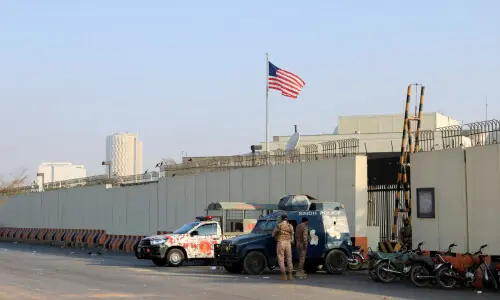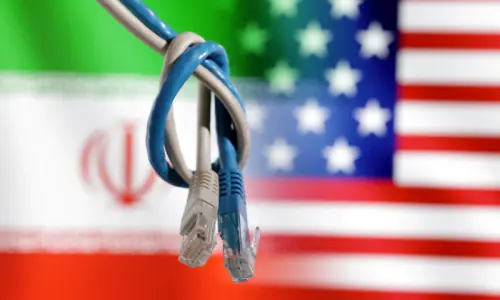Obama’s loud-mouthing
MR Barack Obama, a Democratic presidential hopeful, has joined the chorus of voices demanding or threatening American military action in Pakistan’s tribal region. Since Mr Obama could perhaps be in the White House one day, what he is saying today could well become America’s official policy tomorrow. In a speech made at the Woodrow Wilson International Centre for Scholars Mr Obama spoke of “those mountains” in Pakistan — basically because one doubts if the Senator from Illinois knows whether Waziristan is in Azad Kashmir or in eastern Sindh close to Tibet. Pakistan, he warned, would lose millions of dollars in aid when he would be the president, and order his troops into the area where, according to him, 3,000 terrorists are holed up. Mercifully, sanity seems to prevail in official quarters, and the very day that Mr Obama gave vent to his wisdom, the American ambassador in Islamabad denied that Washington had any such plans. During her visit to Lahore’s historic Badshahi mosque, Ms Anne Patterson said America would continue to support Pakistan in its war on terror and that the US aid to Islamabad would remain uninterrupted.
However, Mr Obama — whom his Democratic rival Hillary Clinton called “naïve” — can draw some solace from the fact that he is not the only one to have indulged in this sort of irresponsible talk; there are others in his country, including some legislators, who have spoken in a similar vein. There is no doubt that Pakistan’s war on terror has run into serious trouble. Last September’s deal with the militants has not worked, and Al Qaeda and Taliban have been able to regroup and strike where they want. Their reaction to the Lal Masjid episode shows that their ability to kill and destroy as far away from Fata as Islamabad remains intact; many would-be suicide-bombers are still lurking around, and one does not know where and when they will strike next. While Islamabad has made strategic and tactical blunders, what hurts is that responsible quarters in America should doubt Pakistan’s commitment to the cause. Islamabad has deployed 90,000 soldiers in the area, at least 800 of them have died in action and hundreds of civilians have lost their lives in suicide bombings. These exclude over 100 killed during the crackdown on the Lal Masjid rebels. What is amazing is that if Pakistan has not succeeded in eliminating terrorists on its soil, what have the US-led forces done in Afghanistan in the last six years? Indiscriminate bombings have killed thousands of Afghan civilians, but the Taliban are as strong as ever, and the coalition forces have failed to check the militants’ two-way movement. As President Pervez Musharraf has said repeatedly, guarding the Durand Line is not Pakistan’s responsibility alone.
If the US-led forces have failed to stamp out terrorism in the plains of Iraq, how can they be expected to crush militants in Waziristan’s mountainous areas? History shows that peace can come to Fata only through talks with the tribal elders, all of whom are not pro-Taliban and some of whom have in fact played a key role in throwing a substantial number of Uzbek militants out of their hideouts. One hopes that Mr Obama’s talk is merely an election-year rhetoric, and that no responsible American would seriously think of getting more of his troops bogged down — this time in Waziristan’s treacherous mountains. The Pakistan Foreign Office has done well by not overreacting to the Obama balderdash.
Trade with India
FEARS that the current imbalance may tilt further to Islamabad’s disadvantage should not dampen efforts to usher in a new era of bilateral trade between Pakistan and India. The ongoing talks between the two commerce secretaries have raised hopes that the volume of trade between the two countries could increase almost six-fold in three years — from 1.62 to ten billion dollars. Moves are also afoot to open branches of at least two Pakistani and Indian banks on either side of the border — a development that would greatly facilitate the regional business community. Already, trade between the two neighbours has doubled in the last two years, with Indian exports to Pakistan accounting for over 77 per cent of the total volume. Pakistan’s exports to India stood at $370 million in 2006-07 compared to $1.25 billion worth of goods flowing in the opposite direction — a state of affairs described as “disconcerting” by the Pakistan commerce secretary.
That said, Pakistan stands to gain from freer and more robust trade with India. Industrial inputs account for between 35 and 40 per cent of Pakistan’s total imports, and it makes economic sense to do business with the cheapest supplier. India has both experience and expertise in the production of heavy machinery and chemicals, and such imports from across the border would be less costly than those from Europe, Australia or North America. This, in turn, would reduce the cost of production in Pakistan, potentially making exports more competitive. Even if exports do not receive a boost, local consumers reeling under inflationary pressures could benefit from less expensive goods. Pharmaceuticals is another area where imports from India can bring relief to the poor and the middle classes. Basic medicines are significantly more expensive in Pakistan than in India, and the availability of cheaper alternatives may help jolt the local industry out of its rapacious ways. Pakistan also has products to sell, such as cement, and the gradual erosion of India’s non-tariff barriers — if and when that happens — could pave the way for other industries as well. Bringing ‘informal trade’ within the official ambit will also benefit the exchequers of both countries.
Threat to NGO in Kohat
IT will be a big blow to this country if NGOs in the tribal or remote areas were to cease their work for security reasons. This is what militants want but it cannot be allowed to happen, especially since the government has all but absolved itself of providing many of the basic amenities that NGOs are now providing. That NGOs continue to work in spite of attacks and bomb threats on their offices or women workers is a testament to their commitment. The latest NGO to come under threat is Kohat Area Development Organisation whose chairperson received a phone call on Wednesday warning them that their offices would be bombed in a week if they did not close four of their centres and expel their female employees and trainees. The NGO is currently training 84 women in computer skills and tailoring. What such threats mean to society is plain to see. Police have beefed up security around the centres but this will hardly deter the narrow-minded militants who are determined to spread terror. And they seem to be succeeding as attacks on NGOs and their workers or anything considered un-Islamic is no longer restricted to tribal areas. Last year, clerics asked an NGO to sack its female employees in Mansehra and later two women two women workers of an NGO were hurt in a blast in Bajaur Agency. Then there are the constant threats to girls who go to school or to parents who want to get the polio vaccination for their children.
These things can no longer be ignored because they are now spreading to settled areas like Kohat and will soon creep into towns and cities. On July 18, police defused a bomb outside a family planning clinic in the heart of Peshawar. The threats are real and pose danger to society and they must be tackled firmly through preventative and punitive action.
Real spirit of Islam
THERE is no religion on earth which advocates, propagates or promotes terrorism in any form. However, Islam, which literally means peace or complete resignation, stands for a world free from wars, conflicts, dissention, suppression, and oppression.
Islam is a religion that lives not just for itself but for the whole of human race. According to Islam, man is born with divine attributes such as kindness, forgiveness, intelligence, power, patience, creative faculty, etc. As he ages, swayed by his lust and evil motives, he starts drifting away from the straight (natural) path. For his guidance, therefore, Allah in His infinite wisdom has sent prophets and revealed Scriptures to them. All prophets preached the best values of faith and conduct.
Prophet Muhammad (SAW) advised his followers, “Imbue yourself with godly virtues.” The virtue of kindness will attain perfection when a man is kind to all the creatures including animals. In showing kindness, Allah does not distinguish between man and man in the case of rain, sunshine, sustenance, etc. Similarly, human beings are required to follow the attributes of Allah without any distinction. The holy Prophet said, “Allah is not kind to him who is not kind to men.”
In order to bring about peace, harmony and tranquillity in the world, Islam has outlined an eternal strategy the basic aspects of which are embodied in the Quran and the traditions of the Holy Prophet. In this context, the first and foremost principle is the equality of human beings. Almighty Allah stipulates in the Quran: “O mankind, We created you from a single (pair) of a male and a female, and made you into nations and tribes so that you may know each other (not that you may despise each other)…” (Al-Hujurat: 13). This Quranic ordainment has a general application and is not confined to Muslims alone. In order to foster feelings of brotherhood among men, the Prophet regarded the entire creation as the “family of God” and added, “The dearest of the creation of God is he who is the best to his family.”
Human life being the most treasured gift of the Almighty, the Quran enjoins, “…if any one killed a person, unless it be for murder or for spreading mischief in the land, it would be as if he killed all mankind, and if anyone saved a life, it would be as if he saved the life of all mankind…” (Al-Maidah: 32). What could be a stronger condemnation of human loss of life and revenge? How could a religion which glorifies human life to such an extent be called a supporter of terrorism by any stretch of the imagination?
That Islam is the veritable upholder of peace in the world is also manifest from the following Quranic injunction: “Allah invites you to mansion of peace, and guides whosever He will to the path that is straight” (Yunus: 25). In sharp contrast to a life of strife and discord, there is a higher life to which Allah is always calling. It is termed as the “mansions of peace” where there is no fear, disappointment or sorrow. Salam (Islamic mode of salutation) meaning peace, is also from the same root as Islam – the religion of unity and harmony.
Islam warns against all acts of terrorism in unambiguous words: “Do no mischief on the earth after it has been set in order…” (Al-Aaraf: 56). It is Allah who has set orderliness on earth by charging all natural forces to work in a coordinated and regulated manner. He, therefore, directs men not to depart from His guidance and thereby create a state of social and moral chaos in the world. Although the Quran holds, “Truly, the religion in the sight of Allah is Islam…” (Aal-e-Imran: 19), yet Islam is tolerant enough to recognise the existence of other religions and leaves the matter to be decided on the Day of Judgment. The Quran declares, “Verily those who believe (in this book), and those who are Jews, and the Sabeans, and the Christians, and the Magians, and those who worship others besides Allah –– truly Allah will judge between them on the Day of Resurrection…” (Al-Hajj: 17).
The Quran even goes a step ahead by praising the righteous among those who believe in Heavenly scriptures: “Yet all of them are not alike. Among the people of the Book is a section upright, who recite the scriptures in the hours of the night and bow in adoration and pray. And believe in God and the Last Day, and enjoin what is good and forbid what is wrong, and who hasten to give charity: they are among the upright and the doers of good” (Aal-e-Imran: 113&114).
The Quran informs the Muslims that not wealth and possessions only (or want of them) are means of their trial. All of their personal talents, knowledge, opportunities, and their opposites – in fact, everything that happens to them and makes up their personality, will be the subject of their testing. So is their faith; they will have to put up for it many insults from those who do not share it. Allah desires them not to be disturbed but to remain righteous and steadfast in such adversities. These virtues will certainly help them, as the determining factor:
“You will, nonetheless, be tried with your wealth and life, and will hear many untoward things from the followers of the former Books and the infidels, but if you endure with patience and follow the straight path, it will surely (accord) with God’s fixed resolve about human affairs” (Aal-e-Imran: 186). The Quran requires Muslims to do justice even to the people who hate them and to whom they have aversion: “O you who believe, stand up as witness for God in all fairness, and do not let the hatred of people deviate you from justice...” (Al-maidah: 8).
Islam grants freedom of faith. Compulsion is incompatible with religion, because: (i)religion depends on faith and will, and these would be meaningless if induced by force, and (ii)Truth and falsehood have been so clearly shown up by the mercy of God that there should be no doubt in the mind of any person of goodwill as to the fundamentals of faith. The Quran makes it plain, “Let there be no compulsion in religion. Verily the right path has become distinct from the wrong path…” (Al-Baqarah: 256).
The believers have been advised to guard against the temptation of thrusting Faith on non-Muslims by physical force or compulsion, such as social pressure, or inducements held out by wealth or position or other material advantages. Forced faith is no faith according to Islam as the Quran maintains: “If your Lord had willed, all the people on the earth would have come to believe, one and all. Are you going to compel the people to believe except by God’s dispensation…” (Yunus: 99 and 100).
Islam even demands the Muslims to abstain from reviling the fake gods worshipped by the people: “And insult not those whom they (disbelievers) worship besides Allah…” (Al-Anam: 108). Utterly persecuted with the hostilities of the unbelievers, The Prophet was once asked to invoke God’s wrath for them. He replied, “I have been sent not to curse, but I have been raised up mercy (for all).”
War is permissible in Islam in self-defence and well-defined limits to restore peace and freedom for worship of Allah: “Fight those in the way of God who fight you, but do not be aggressive: God does not like aggressors”(Al-Baqarah: 190). Those unbelievers who are at peace with the Muslims have to be dealt with kindness and equality: “God does not forbid you from being kind and acting justly towards those who did not fight over faith with you…” (Al-Mumtahanah: 8).
The life of Prophet Muhammad is replete with examples of mercy even to his worst tormentors. Islam strongly condemns confrontation in religious matters and supports negotiations in a congenial atmosphere. Preaching must be, not dogmatic, not self-regarding, not offensive, but gentle, considerate and such as would attract people’s attention. The Quran ordains, “Call them to the path of your Lord with wisdom and words of good advice; and reason with them in the best way possible…” (An-Nahl: 125).
The Quran commands the Muslims to be especially courteous with the Jews and Christians. In order to achieve their purpose as true standard-bearers of Allah, they shall have to find common grounds of beliefs with them (Jews and Christians) and also to show by their urbanity, kindness, sincerity, truth, and the genuine anxiety for the good of others. The Almighty proclaims: “And argue not with the people of the Scriptures unless it be in (a way) that is better except with such of them as do wrong and say (to them): “We believe in that which has been revealed to us and to you, our God and your God is One (Allah) and to Him we surrender (as Muslims)” (Al-Ankabut: 46).
Once the Prophet saw a funeral procession pass by and he stood to pay respect to it. He was informed that the deceased was a Jewess. He said, “Death is surely terrible. So, when you see a funeral stand up.”
It is, therefore, amply established that Islam and terrorism are antipodal. Unfortunately, Islam is being blamed and projected these days as a religion of fanaticism. Acts of terrorism committed by a handful of misguided Muslims are being played up in the western media as being the basic teachings of Islam. Most of the critics of Islam do not have correct perception of its tenets and their approach is subjective and biased.
In fact, Islam brought into existence a harmonious society for the first time in the annals of human living at a time when the West lived in total darkness devoid of any concept of freedom and human rights. In the “Spirit of Islam”, Justice Sayyed Amir Ali observed, “Freedom is ensured in the Quran; both inborn and acquired. There is no distinction between a believer and non-believer in this respect. What is prohibited is evil and what is lawful is good for all men.”
| © DAWN Group of Newspapers, 2007 |




























